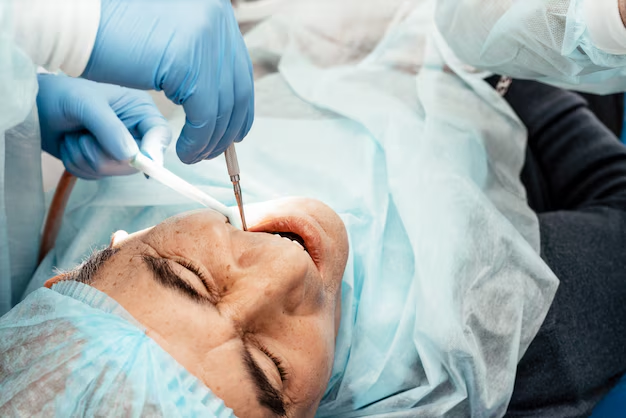Your Guide to Does Medicare Cover Oral Surgeons
What You Get:
Free Guide
Free, helpful information about Medicare Insurance and related Does Medicare Cover Oral Surgeons topics.
Helpful Information
Get clear and easy-to-understand details about Does Medicare Cover Oral Surgeons topics and resources.
Personalized Offers
Answer a few optional questions to receive offers or information related to Medicare Insurance. The survey is optional and not required to access your free guide.
Does Medicare Help with Oral Surgery Costs? Here's What You Need to Know
Navigating the complex world of healthcare coverage can be daunting, especially when it comes to specialized medical services like oral surgery. If you're wondering whether Medicare covers oral surgeons, you're not alone. Here's a clear, concise look at what you need to know about this aspect of your healthcare plan.
What Does Medicare Cover?
Medicare is primarily designed to cover services that are deemed medically necessary. However, dental services are traditionally not covered by Medicare. This means that routine dental care such as cleanings, fillings, and extractions, as well as oral surgery, are not typically covered. There are exceptions, particularly if the oral surgery is intimately linked to a medical condition or a procedure that Medicare does cover.
Exceptions for Oral Surgery
There are scenarios where Medicare might foot the bill for oral surgery:
When it's part of a covered service: If oral surgery is required in relation to a medical condition that Medicare covers, then the cost might be assumed by Medicare. For example, oral examinations prior to a kidney transplant or heart valve replacements.
Hospitalization: If oral surgery needs to be done in a hospital setting due to the complexity or risk, Medicare Part A may cover hospital charges, although the surgery itself might not be covered unless it meets specific criteria.
Facial surgery following an accident: If there's trauma requiring immediate medical attention, including oral surgery, that incident could be covered by Medicare.
Alternatives and Financial Assistance
While these exceptions can provide some relief, most people will find that they need additional coverage or financial assistance when it comes to oral surgery. Here are some options to consider:
Medicaid
If you're eligible, Medicaid could cover dental care, including some oral surgeries. The extent of coverage can vary by state, so it is essential to check with your local Medicaid office to see what's available.
Medicare Advantage Plans (Part C)
These plans, offered by private insurers approved by Medicare, often include additional benefits that original Medicare doesn't cover, including dental, vision, and hearing services.
Standalone Dental Insurance
Purchasing a separate dental plan can help cover costs that Medicare doesn’t. Various plans are available that cover a range of services, including oral surgery, with varying premiums, coverage levels, and networks.
Flexible Spending Accounts (FSAs)
If you have an FSA through your employer, you can use pre-tax dollars to pay for dental procedures, including oral surgery, which can significantly reduce out-of-pocket costs.
Health Savings Accounts (HSAs)
For those with high-deductible health plans, contributions to an HSA can also be used for dental expenses. This provides a tax-advantaged way to save for potential healthcare costs, including surgeries.
Further Financial Support
If you're struggling to manage healthcare costs, there are several programs and options to consider:
State-based and Local Programs: Many states offer programs that provide financial help for dental services.
Charitable Organizations: Some nonprofit organizations offer financial aid or free clinics for dental services.
Dental Schools: Some dental schools offer reduced-cost services provided by supervised students.
By understanding your options, you can take a proactive approach to managing costs related to oral surgery, ensuring you get the care you need without undue financial strain.
Handy List of Alternatives and Support Options
- 💡 Medicaid: Varies by state but can include dental coverage.
- 🏦 Medicare Advantage (Part C): Offers extended benefits, including potential dental coverage.
- 🦷 Standalone Dental Insurance: Covers services not included in regular Medicare.
- 📊 Flexible Spending Accounts (FSA): Pre-tax funds for dental expenses.
- 💼 Health Savings Accounts (HSA): Tax-advantaged savings for medical expenses.
- 🌍 State and Local Aid Programs: Additional resources for low-income individuals.
- 🏥 Dental Schools: Affordable care options through teaching establishments.
Taking these steps can greatly alleviate the financial burden of necessary oral surgeries and other healthcare expenses, enabling you to maintain your health without compromising your financial security.
What You Get:
Free Medicare Insurance Guide
Free, helpful information about Does Medicare Cover Oral Surgeons and related resources.

Helpful Information
Get clear, easy-to-understand details about Does Medicare Cover Oral Surgeons topics.

Optional Personalized Offers
Answer a few optional questions to see offers or information related to Medicare Insurance. Participation is not required to get your free guide.


Discover More
- Am I Elgible For Medicare
- Am I Enrolled In Medicare
- Am I Qualified For Medicare
- Are Adult Diapers Covered By Medicare
- Are Chemotherapy Drugs Covered By Medicare Part d
- Are Colonoscopies Covered By Medicare
- Are Covid Tests Covered By Medicare
- Are Cpap Machines Covered By Medicare
- Are Cpap Supplies Covered By Medicare
- Are Dental Implants Covered By Medicare
